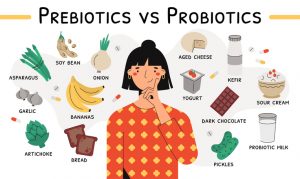By Isabella Swiecicki – Dietetic Intern, Duke Lifestyle & Weight Management Center.
Over a year has passed since COVID 19 was declared a pandemic by the World Health Organization (WHO). For many, the challenges caused by the pandemic go beyond the threat of physical infection, emphasizing the need to address mental health as a measure of wellbeing. The US Census Bureau found that by December 2020, there had been a 31% increase in reported symptoms of anxiety and depression from the year prior (Abbott, 2021). But there is more to the story about what causes changes in mental health. Numerous studies indicate gut health can significantly impact our mood. Could the food choices we make help see us through this stressful period in time?

The saying “eat the rainbow” has never been more accurate.
The gut is often referred to as the “second brain,” for good reason. The gut microbiome is defined as the trillions of microbes (such as bacteria, viruses, and fungi) living in our intestines (Pennisi, 2020). These microbes act as messengers, interacting directly with the central nervous system (CNS); this communication between the two is often called the gut-brain axis (Pennisi, 2020). Gut microbes secrete substances, such as messenger molecules, or activate the secretion of hormones that enter our blood vessels and travel to the brain. It could be said that our food choices determine the type of bacteria in our gut, which influences the messages sent to our brain. If we eat foods that promote unhealthy bacteria, our gut will communicate messages to the brain that worsen our mood and vice versa.

The saying “eat the rainbow” has never been more accurate. Eating a variety of foods means that we’re feeding a variety of bacteria. A diverse microbiome is healthy, and a healthy gut promotes a healthy brain. Eating different fruits, vegetables, and legumes (beans, lentils, peas) is important because they are packed with fiber, vitamins, and minerals. Research has shown that a diet rich in fruits and vegetables may prevent the growth of disease-causing bacteria (Klinder, Annett, et al., 2016).
 Fiber is not digested by our bodies; it is digested by the bacteria in our gut and helps stimulate their growth. Fiber, when fermented in our gut, produces short-chain fatty acids (SCFAs). SFCAs are important in regulating metabolic endocrine and immune function and influencing brain behavior. High fiber foods include green peas, chickpeas, broccoli, lentils, beans (white, kidney, pinto, etc.), whole grains, raspberries, strawberries, apples, avocado, and carrots, artichokes, and much more.
Fiber is not digested by our bodies; it is digested by the bacteria in our gut and helps stimulate their growth. Fiber, when fermented in our gut, produces short-chain fatty acids (SCFAs). SFCAs are important in regulating metabolic endocrine and immune function and influencing brain behavior. High fiber foods include green peas, chickpeas, broccoli, lentils, beans (white, kidney, pinto, etc.), whole grains, raspberries, strawberries, apples, avocado, and carrots, artichokes, and much more.
 Fermented foods have been altered through the breakdown of their carbohydrates by yeast and bacteria (Rapson, 2018). These foods can benefit the microbiome by optimizing its function and promoting the growth of beneficial bacteria. Fermented foods include yogurt, kefir, sauerkraut, kimchi, kombucha, tempeh, and miso.
Fermented foods have been altered through the breakdown of their carbohydrates by yeast and bacteria (Rapson, 2018). These foods can benefit the microbiome by optimizing its function and promoting the growth of beneficial bacteria. Fermented foods include yogurt, kefir, sauerkraut, kimchi, kombucha, tempeh, and miso.
Prebiotics are foods, mostly different types of fiber, that the body cannot digest (6). Prebiotic foods promote the growth of microbes in the gut. Prebiotic foods include garlic, onions, leeks, asparagus, unripe bananas, oats, and dandelion greens.

Probiotics are live bacteria found in supplements and certain foods (Watson, 2017). Studies have shown that probiotics can benefit gut bacteria function and influence the types of chemicals produced by bacteria (Eloe-Fadrosh, Emiley A, et al., 2015). In addition to supplements, fermented foods, specifically yogurt and kefir, are a great source of probiotics.
Shifts in eating patterns and daily routines greatly impact our mood, magnifying feelings of depression and anxiety. Therefore, the argument could be made that the journey to improving our mental health may begin by examining what’s in our gut.
1. Abbott, Alison. “COVID’s Mental-Health Toll: How Scientists Are Tracking a Surge in Depression.” Nature News, Nature Publishing Group, 3 Feb. 2021, www.nature.com/articles/d41586-021-00175-z.
2. University of Minnesota Medical School. “COVID-19 pandemic has been linked with six unhealthy eating behaviors: Study shows a slight increase in eating disorders, one of the deadliest psychiatric health concerns.” ScienceDaily. ScienceDaily, 12 April 2021. www.sciencedaily.com/releases/2021/04/210412114740.htm.
3. Elizabeth Pennisi. May. 7, 2020. “Meet the ‘Psychobiome’: the Gut Bacteria That May Alter How You Think, Feel, and Act.” Science, American Association For The Advancement of Science, 11 May 2020, www.sciencemag.org/news/2020/05/meet-psychobiome-gut-bacteria-may-alter-how-you-think-feel-and-act.
4. Klinder, Annett, et al. “Impact of increasing fruit and vegetables and flavonoid intake on the human gut microbiota.” Food & function vol. 7,4 (2016): 1788-96. doi:10.1039/c5fo01096a
5. Rapson, Jeanette. “What Are the Benefits of Fermented Foods?” Heart Foundation NZ, Heart Foundation NZ, 20 Aug. 2018, www.heartfoundation.org.nz/about-us/news/blogs/fermented-foods-the-latest-trend.
6. Watson, Kathryn. “Prebiotics vs. Probiotics: What’s the Difference?” Healthline, Healthline, 23 May 2017, www.healthline.com/health/prebiotics-vs-probiotics.
7. Eloe-Fadrosh, Emiley A et al. “Functional dynamics of the gut microbiome in elderly people during probiotic consumption.” mBiovol. 6,2 e00231-15. 14 Apr. 2015, doi:10.1128/mBio.00231-15
Our individualized nutrition services treat specific health conditions, manage weight healthfully, and attain optimal vitality through a wholesome diet. Our nutritionists understand that getting on the right path toward your health goals is a process that requires support, adjustment, and taking small steps to make lasting and positive changes. Work with a nutritionist to discover the connection between food, movement, stress, and rest and make strategic changes to your diet to help you achieve your goals.
Integrative Nutrition at Integrative Medicine →
Diet & Nutrition Counseling at the Duke Lifestyle & Weight Management Center →
Nutrition Consultations at the Health and Fitness Center →
As the new year begins, many of us set fitness goals that require finding the right gym. Choosing the right facility can significantly impact your motivation and progress. Here are five essential factors to consider before signing up.

Aromatherapy, the practice of using essential oils extracted from plants for therapeutic purposes, has been a cornerstone of holistic health for centuries. Rooted in ancient traditions, it has grown in popularity in modern times due to its ability to promote relaxation, alleviate stress, and improve overall well-being. This article explores ...
READ MORERadical acceptance is the practice of fully accepting reality without judgment or resistance. It is not about approving harmful situations or giving up but rather letting go of the internal struggle against reality. This transformative approach can reduce emotional suffering and foster inner peace. Explore the concept of radical acceptance ...
READ MORE